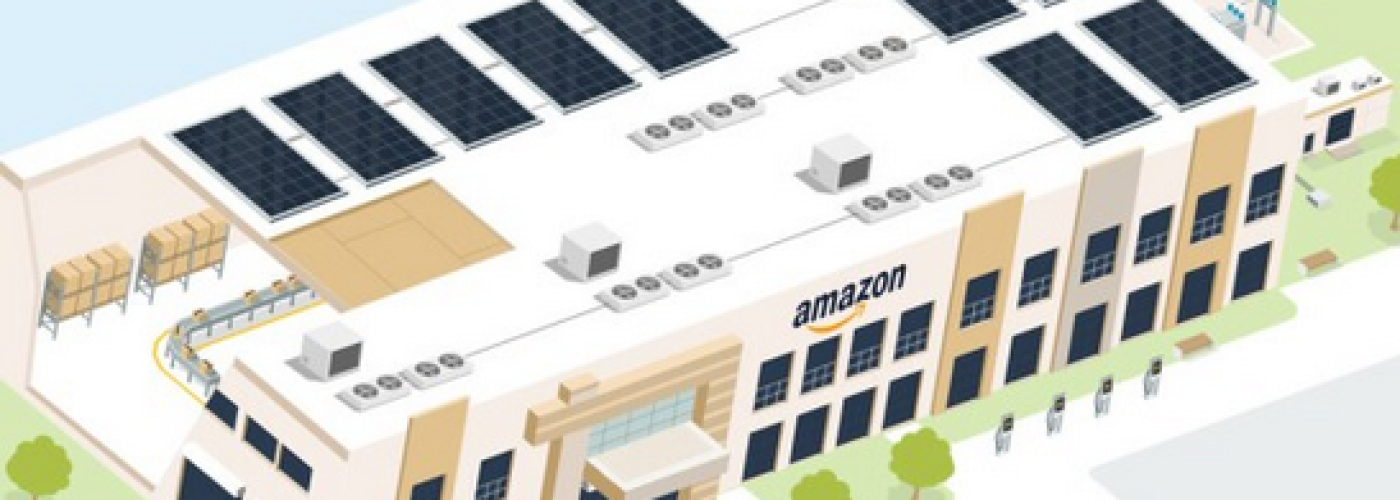The Chartered Institution of Building Services Engineers (CIBSE) is pleased to announce new comprehensive Europe-wide guidance, Embodied carbon in building services: logistics centres (TM65.3). This is a groundbreaking industry guidance that helps the logistics industry assess the embodied carbon of material handling equipment (MHE) and mechanical, electrical and plumbing (MEP) equipment commonly used in logistics centres. The guidance was developed with the support of Introba and Amazon.

This is the first industry-wide guidance and methodology that aims to foster informed data-based decision-making as the logistics industry works towards reducing its environmental footprint. The guidance enables the industry to gain a deeper understanding of its environmental impact and identify opportunities for decarbonisation. According to a Research and Markets report, the global market size of MHE was $128Bn, and is estimated to reach $193Bn in 2030*.
Embodied carbon encompasses greenhouse gas emissions associated with materials and construction processes across different lifecycle stages. The guidance finds that MHE can represent an additional 17-53% of a typical logistics building’s embodied carbon. This shows that companies can reduce their environmental impact by making more informed decisions about the type of equipment used in their warehouses, and equipment manufacturers have the opportunity to differentiate and lead by developing equipment with lower carbon footprints.
TM65.3 builds upon the methodology outlined in Embodied carbon in building services: A calculation methodology (TM65), a calculation method for embodied carbon emissions in building services design that provides a robust framework for understanding and mitigating environmental impact. TM65.3 will benefit a wide array of stakeholders, including logistics building owners, manufacturers, retailers, architects, engineers, policymakers, researchers and students. By providing comprehensive insights into the embodied carbon impact of MHE and MEP strategies, the document empowers those stakeholders to make informed decisions aligned with their organisation’s sustainability goals.
CIBSE’s Technical Director, Dr Anastasia Mylona stated: “This launch marks a significant milestone in understanding the embodied carbon implications of logistics buildings and underscores our commitment to sustainability within the built environment. By pooling our expertise with Amazon and Introba, we will empower stakeholders across the logistics sector with actionable insights to drive positive change.”
Frank Lindner, Director, Operations Engineering EMEA, Amazon: “Calculating and understanding embodied carbon is a challenge across many sectors, and we’re proud to have supported CIBSE in their efforts to create robust industry guidance that will help Amazon and all those in the industry better understand their footprints and make more informed design and buying decisions.”
Introba’s Head of Sustainability for UK & Europe Andy Stanton said: “TM65.3 is our first step along the journey to quantifying the embodied carbon across various logistics building typologies, particularly material handling equipment. There is no sign of demand for goods and services decreasing any time soon, so the need to understand the embodied carbon of the fast-growing logistics sector is paramount.”
As the logistics industry continues to evolve, TM65.3 will serve as a dynamic resource, with information continually updated as more manufacturers disclose data and Environmental Product Declarations (EPDs) become more prevalent. This ongoing collaboration between CIBSE, Amazon and Introba underscores a shared commitment to sustainability and innovation within the logistics sector.
For more information on TM65.3 please visit CIBSE TM65.3 Embodied carbon in building services * Global Material Handling Equipment Markets Report 2023: Market to Reach $193 Billion by 2030 – 3PL, E-Commerce and F&B Manufacturing & Retail Driving Growth (yahoo.com)

Building, Design & Construction Magazine | The Choice of Industry Professionals





